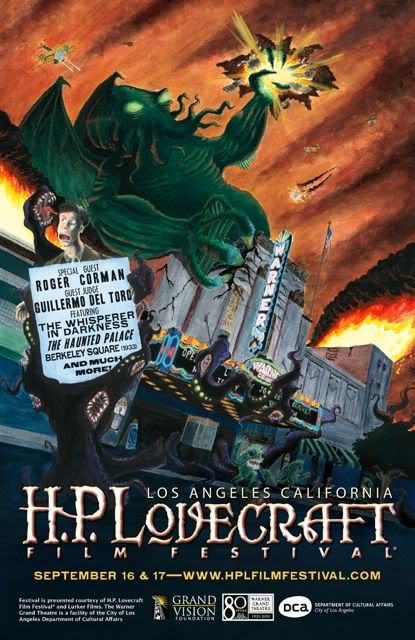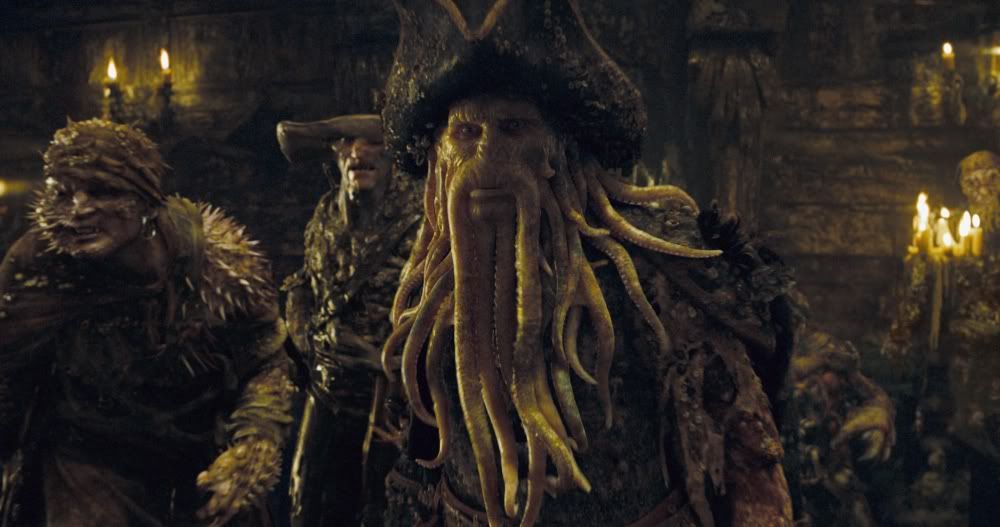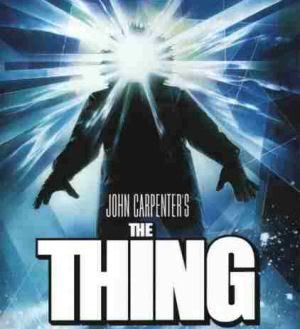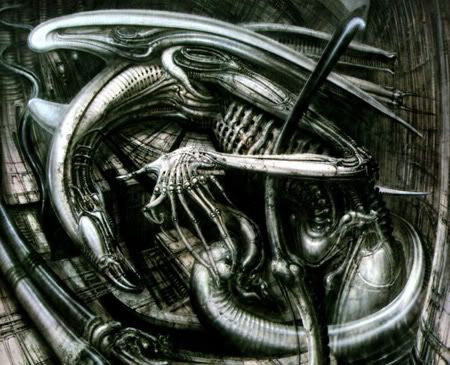
The popular H.P. Lovecraft film festival was founded in 1995 by Andrew Migliore in the hope that H.P. Lovecraft would be rightly recognized as a master of gothic horror and his work more faithfully adapted to film and television. Study the current body of films and it's easy to see why this is needed.
16 years later, that goal has met differing degrees of success, although we can say that much of the aesthetics and principles of Lovecraftian fiction has been deeply influential on modern cinema and literature. Some elements get discarded and some are jumping the shark, or the squid, as may be the case.

A long running joke is that literature's master of unspeakable horror is also unfilmable, given the number of inept works that have been made to date. I can think of many films 'based' on the writings of H.P. Lovecraft I'd as soon see banished beyond the wall of sleep.
But given 48 hours or so, what films would I suggest to engage new audiences with Lovecraft's work?
I'd personally go with a mix of films and TV shows indirectly inspired by Lovecraft rather than those directly inspired by Lovecraft for now. On my shortlist would be:
Directly Influenced Feature-Length Films:
Re-Animator, directed by Stuart Gordon. (1985). Approaching nearly thirty years since it was released, it still holds up better than most works before or since. It is definitely flawed, but Jeffrey Combs as young Dr. Herbert West steals the show. Re-Animator gives you some memorable and horrific images that you won't soon forget. Gordon tends to be loved or hated by fans of Lovecraft's work, but this is one that I would always include for emerging fans to consider. Skip the sequels, though.
Dagon, also directed by Stuart Gordon. (2001). Dagon shows in interesting development in Gordon's technique. Based on the classic H.P. Lovecraft story, "The Shadow Over Innsmouth," but set in the sleepy Spanish village of Im Boca. Fans may be riled by the moments of levity interspersed throughout this piece but I applaud it for its uncompromising finale.
To be honest, after these two, the rest tend to be unwatchable dreck and it's really easy to see why fans are clamoring for better adaptations.
Directly Influenced Shorts:
For some reason, H.P. Lovecraft's work has fared slightly better in short films and TV episodes. There were several episodes of Night Gallery that directly adapted his work the most notable being Pickman's Model and Cool Air but as a fair warning, they're undone by horrible, cheesy effects before it's all over, so I can't recommend these with much enthusiasm. As a side note to film-makers: Enough with the Cool Air remakes. It's an easy premise, and no one's gotten it really right yet, but enough's enough for now.
Dreams In the Witch House Showtime's The Masters of Horror had an acceptable Stuart Gordon adaptation of the H.P. Lovecraft story of the same name.
The Collect Call of Cathulhu was an episode of The Real Ghostbusters, and for a 30 minute kids cartoon from the 1980s it's actually a fun watch, even if the good guys do eventually win, contrary to most Lovecraftian themes.
And of course the H.P. Lovecraft Historical Society's Call of Cthulhu silent film falls firmly in this category.
Unofficially Lovecraftian:

Deep Rising from 1998 gets my vote for inclusion in such a festival not just because of it's giant tentacled underwater terror, but also because it's reasonably consistent in quality, good for more than a few laughs with some fun characters. For a Cthulhu 101 introduction, this is a film that can spark some excellent debates.
Among underwater horror films, 1989's Leviathan is also a good film for consideration, and definitely trumps James Cameron's The Abyss or Deep Star Six, which also came out in the same year. While I could argue that it's a blend of Kafka meets Lovecraft on a boat, my primary argument for Leviathan would be it's combination of the creature's origins and the terror of an uncaring cosmos for the protagonists. Neither the creature, its creator, or their employers are going to come to help, and after a while, you don't feel certain about the reliability of your fellow humans either. IF they're still human.


The Descent from 2005 by Neil Marshall is also a key film from the last 10 years I would cite for excellence in probing Lovecraftian themes. Far better than The Cave which came out the same year. With The Descent, we see an excellent case of what an uncompromising Lovecraftian story looks like with female protagonists (which was not Lovecraft's strong suit). Exploring the subterranean, the threat of madness and insanity, and uncovering ancient, unknown horrors? This film's got it in spades. In The Cave, you're presented with a possibility of victory. In The Descent, getting out is all that matters, or, appropriate to a Lovecraftian story, going utterly mad before the entity gets an acceptable second-place.
In the close but no cigar category: Phantoms is a 1989 film explores Lovecraft's themes of an ancient, unstoppable, parasitic alien presence. Compared to The Blob where the horror comes from outer space, this is one that's unleashed from below ground. However, its defeat is extremely ridiculous.
The Hellboy series by Guillermo Del Toro has some Lovecraftian imagery and themes, but there's still a vein of hope within it that I'd recommend Pan's Labyrinth instead if you're looking for how Del Toro addresses Lovecraftian themes. In Pan's Labyrinth, beyond the creatures is a deeper contemplation of sanity, hidden worlds and madness that Lovecraft would appreciate.
What films would you include as a cinematic introduction to Lovecraft?
2 comments:
Hey Bryan,
Came across your blog with the "next blog" thing on Blogger.
"Indirectly," perhaps a Clive Barker film like Hellraiser.
Ah, excellent example. Even the first sequel was very much within a Lovecraft's territory. The rest not so much. But when you see the big reveal that the Cenobite's 'god' was not a humanoid or obviously sentient entity, but just this massive obisidian diamond, it's right up there with A Color Out of Space. "How do you fight a shape?"
Post a Comment